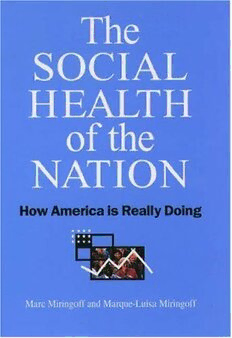
The Social Health of the Nation: How America Is Really Doing PDF
262 Pages·1999·13.963 MB·English
Most books are stored in the elastic cloud where traffic is expensive. For this reason, we have a limit on daily download.
Preview The Social Health of the Nation: How America Is Really Doing
Description:
For the past twelve years, the annual release of the Index of Social Health has been a major event, cited in The New York Times, The Washington Post, and other national media our most reliable barometer of progress in addressing America's social ills. Now, in The Social Health of the Nation, the Index for 1999--an invaluable fount of information--is available for the first time in book form. Rejecting the notion that the Dow Jones Industrial Averages and its ilk are the sole valid measures of progress in the United States, the authors offer a fuller and deeper view of our nation's quality of life, gathering together statistical information on such factors as the well-being of America's children and youth, the accessibility of health care, the quality of education, or the adequacy of housing. Readers will find solid information about drug abuse, children in poverty, life expectancy, homicides, and health insurance coverage. And we get these facts in context, so that we know where we are improving--for instance, poverty among the elderly, infant mortality, and the high school dropout rate have all declined. Equally important, we discover where we are losing ground--suicide rates among the young are 40 percent higher than in 1970, for example, and income inequality is at its worst level in 50 years. Here then is the key to the true State of the Union. The first national survey in the U.S. to bring together varied aspects of social health, including education, work, family, medical care, American culture, and the arts, The Social Health of the Nation gives us a more finely focused picture of the national fabric--and reveals where that fabric needs mending.
See more
The list of books you might like
Most books are stored in the elastic cloud where traffic is expensive. For this reason, we have a limit on daily download.
